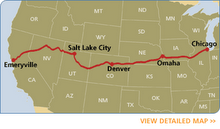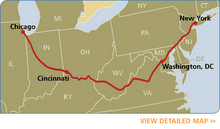
Getting back to the hotel took up the rest of the day. My feet were swollen; I was hungry, hurting in body and spirit. When I returned to my room, I simply put my feet up and my head down. The trip wasn't quite over yet, but I was leaving the next night on the train for New York without getting what I came for; so, for all intents and purposes, it might as well be.
A friend of my sister's, who lives in Chicago, came by and showed me around the city. Her parents grew up here. We drove, not around the Magnificent Mile, but to Bronzeville into neighborhoods where redevelopment was taking place. My tour guide pointed out the changes being made in the various neighborhoods and how gentrification was pricing out even middle-class people, like her. Chicago, again, reminded me of St. Louis, where I was born and my parents were born -- crumbling stone buildings, next to empty overgrown lots and trees dying without grace or growing without attention. Some of these now had been bought and remodeled. Stripped of stonework and wrought-iron, some looked embarrassed, as if they realized they were being made over into something that they were not. In-between, new growth, new buildings, some mimicking their older neighbors, like awkward younger siblings. Their lack of wisdom and experience was painfully obvious. Other times, buildings were restored, as close as they could be to their original appearance and then I could see the neighborhoods that became home to hundreds of black folks, escaping the oppression of southern racism.
We stopped to attend the gallery opening of a friend of a friend, Rosalind McGary at the Steelelife Gallery. The gallery is on the second floor in a small loft-like setting -- wood floors and exposed brick, much like you would expect from a artist-owned space. Rosalind's work is tremendously detailed and meditative. Their power seems to be in their ability to convey both movement and stillness simultaneously.

In looking at them, I find my restlessness and my frustration waning. From a distance, her work is deceptively simple, just an interplay of texture and lines; even the mediums upon which she chooses to paint, wood mostly, add these layers of texture and depth.

Then you step up to them and you see that in some of these paintings, these patterns have been created by the tiniest dot of paint, each one painstakingly placed to create this mosaic effect. So when you step up to it, the effect is three-dimensional, as if this image is floating off the surface and reaching out to you. The ethereal becomes real.

I was a little stunned, both by the effect and the work that I realized went into each piece. I asked Rosalind how long it took her to do one of those paintings. She told me, "I try not to think about it. Depending on the piece, a year or more." Suddenly, I felt a little ashamed of myself. My little setback was nothing compared to the time and commitment she had made to a single painting, even the commitment to her vision of her work. Surely it would be easier to do it another way, but she doesn't.
That is the way it is with all things I think. The BSCP spent ten years, a decade, working to get recognized as a union and that seems like such a long time, when giving up seems so much easier and sometimes, it seems sensible and responsible. That's how treacherous our minds can be. When our lives tells us that our commitment to the truth is an indulgence, a luxury that we can't afford and we believe it, we lose.
Now I was never going to give up but I often wonder why I bother, especially when the rewards seems so out-of-reach. The writing I do, because it requires research, because it is a novel, occurs in a vacuum. I am alone there, in the world created in my own head and though I'd like to invite people in, I can't. Not yet. Its too fragile. I'm the guide and I don't know my way. Yet.
I am really reminded of this when later, after some famous Chicago-style pizza, we pass a bookstore, full of people, streaming out the door with their excitement spilling into the street. Harry Potter and the Deadly Hallows will be released at midnight. Say what you will about commercialism, but that woman spent over a year on public assistance (British version), writing in a cafe, stretching out her cups of coffee and writing her story. Her setbacks, far greater than mine, and the list of reasons to stop far longer than the list to go on. She didn't.












